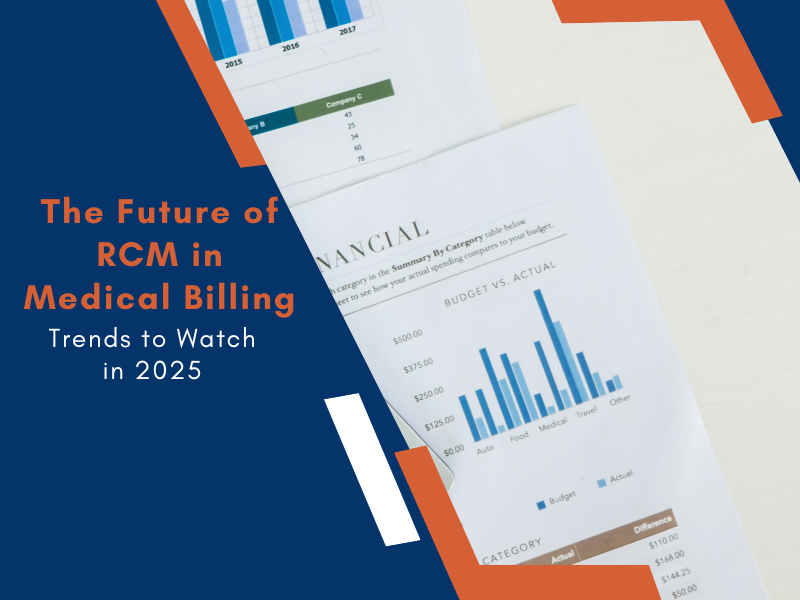The healthcare industry is evolving rapidly, and with it, revenue cycle management (RCM) in medical billing is undergoing significant transformations. As we step into 2025, providers, payers, and patients alike will experience changes shaped by emerging technologies, evolving regulations, and the increasing demand for efficiency and accuracy in healthcare operations. In this blog, we’ll explore the top trends shaping the future of RCM in medical billing and how these changes will impact the industry.
1. Emphasis on Automation and AI
Automation and artificial intelligence (AI) are transforming the landscape of RCM in medical billing. Advanced tools like robotic process automation (RPA) and AI-driven analytics are helping healthcare providers streamline repetitive tasks, such as claim submissions, denial management, and payment posting.
By reducing manual interventions, automation minimizes errors, improves efficiency, and accelerates cash flow. For example, predictive analytics powered by AI can help providers identify claims likely to be denied, allowing for preemptive corrections. In 2025, the integration of AI tools is expected to become even more widespread, enabling providers to enhance their billing operations.
2. Real-Time Data Analytics
The use of real-time data analytics is no longer a luxury but a necessity in RCM. As healthcare providers deal with massive volumes of data, leveraging advanced analytics tools ensures better decision-making and improved financial outcomes.
Real-time insights into claim performance, payment trends, and patient payment behaviors allow providers to make proactive adjustments to their RCM strategies. In 2025, more organizations will adopt advanced analytics platforms to monitor key performance indicators (KPIs) and optimize their revenue cycles.
3. Increased Focus on Patient-Centric Billing
The shift towards patient-centered care is influencing every aspect of the healthcare experience, including billing. Patients now expect transparency, simplicity, and flexibility when it comes to their medical bills.
In 2025, RCM in medical billing will prioritize clear and concise communication of financial obligations. Providers will offer user-friendly billing portals, transparent pricing estimates, and flexible payment options to enhance the patient experience. These changes not only improve patient satisfaction but also increase the likelihood of timely payments.
4. Strengthening Denial Management Practices
Claim denials remain one of the biggest challenges in RCM. According to industry reports, a significant percentage of denials can be attributed to avoidable errors like incorrect coding, missing information, or late submissions.
In 2025, healthcare organizations will invest in advanced denial management solutions. These include automated denial tracking systems that analyze root causes and provide actionable insights for preventing future denials. Providers will also emphasize staff training and collaboration with payers to reduce the volume of denied claims.
5. Integration of Interoperable Systems
Interoperability is becoming a critical component of effective RCM in medical billing. Seamless data exchange between healthcare providers, payers, and patients ensures that billing processes are accurate, transparent, and efficient.
In 2025, the adoption of interoperable systems will gain momentum, enabling providers to share information securely and streamline processes like eligibility verification, prior authorizations, and payment reconciliation. This enhanced connectivity will be crucial for improving the overall efficiency of the revenue cycle.
6. Growing Demand for Credentialing and Compliance
Compliance with regulatory requirements and payer policies is more important than ever. In 2025, providers will face heightened scrutiny over accurate billing practices and provider credentialing.
Maintaining up-to-date credentials and adhering to payer-specific guidelines will play a pivotal role in minimizing claim rejections and ensuring timely reimbursements. Outsourcing credentialing to specialized RCM companies will become a popular strategy to manage these complexities effectively.
7. Shift Towards Value-Based Care Models
Value-based care models are redefining the traditional fee-for-service approach, placing greater emphasis on patient outcomes and cost efficiency. This shift impacts RCM in medical billing, requiring providers to adapt their billing practices to align with new payment models.
In 2025, providers will adopt advanced tools to track and report quality metrics, ensuring compliance with value-based contracts. These changes will necessitate more collaborative relationships between payers and providers to achieve shared financial and care goals.
8. Enhanced Use of Telehealth Billing Solutions
The growth of telehealth services has introduced new challenges and opportunities in RCM. Providers must navigate complex billing regulations and ensure proper coding for virtual visits.
In 2025, telehealth billing solutions will become more sophisticated, integrating seamlessly with existing RCM systems. Automated coding tools and payer-specific billing guidelines will simplify the reimbursement process for telehealth services, making it easier for providers to manage this growing segment of care.
9. Workforce Challenges and Remote Solutions
Workforce shortages in the healthcare industry are likely to persist in 2025, prompting organizations to explore remote and outsourced RCM solutions. Outsourcing key RCM functions to specialized billing companies will allow providers to focus on patient care while ensuring the financial health of their practices.
Remote work solutions, combined with cloud-based RCM platforms, will enable seamless operations and improved productivity, even with a distributed workforce.
10. Cybersecurity in RCM
As healthcare organizations increasingly rely on digital tools for RCM in medical billing, the risk of cyber threats continues to grow. Protecting sensitive patient and financial data will remain a top priority in 2025.
Providers will invest in robust cybersecurity measures, including encryption, multi-factor authentication, and real-time threat detection systems. Ensuring compliance with regulations like HIPAA will be essential to safeguarding patient trust and avoiding financial penalties.
Preparing for the Future with Apaana Healthcare
As the future of RCM in medical billing unfolds, healthcare providers need a reliable partner to navigate the complexities of this dynamic landscape. Apaana Healthcare is committed to driving operational excellence with cutting-edge solutions tailored to your needs.
At Apaana Healthcare, we specialize in outsourced services for health plans, covering:
- Member Enrollment: Ensuring seamless onboarding of patients and members.
- Claims Administration: Streamlining claim submissions, tracking, and reimbursements.
- Medical Billing & Coding: Providing accurate and efficient billing solutions.
- Provider Engagement: Facilitating strong payer-provider relationships.
Our expertise ensures cost-effective solutions that help you stay ahead in an ever-changing healthcare environment. With Apaana Healthcare as your partner, you can focus on what matters most—delivering exceptional care to your patients.
Final Thoughts
The future of RCM in medical billing is filled with opportunities for growth and innovation. By embracing emerging technologies, enhancing patient-centric practices, and prioritizing compliance and security, providers can position themselves for success in 2025 and beyond.
Partner with Apaana Healthcare to unlock the full potential of your revenue cycle. Let us help you achieve operational excellence and navigate the challenges of tomorrow with confidence.





